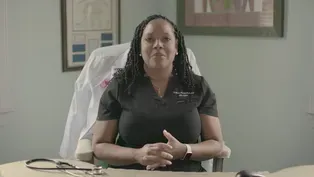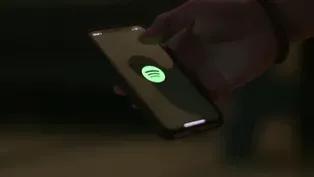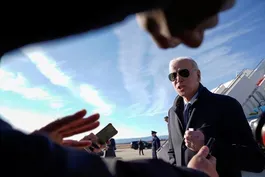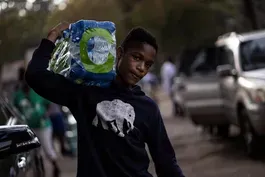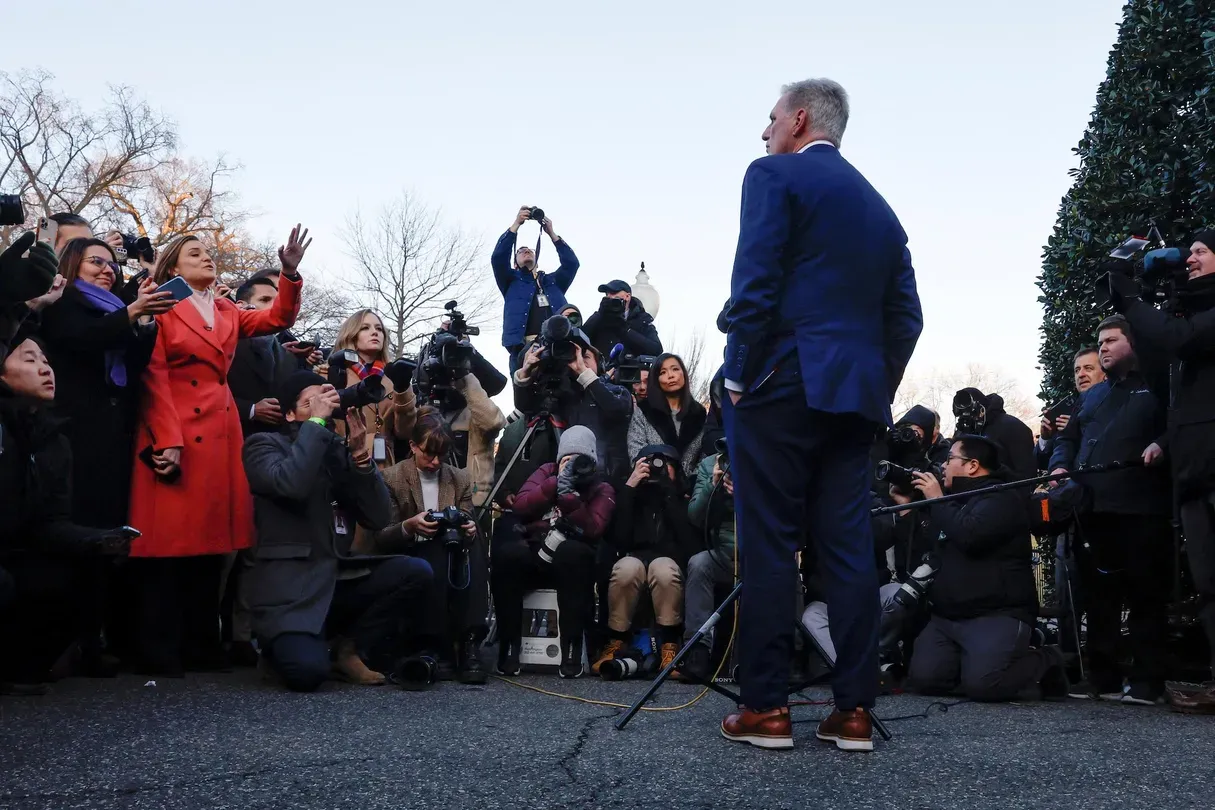

February 5, 2023 - PBS News Weekend full episode
2/5/2023 | 26m 45sVideo has Closed Captions
February 5, 2023 - PBS News Weekend full episode
February 5, 2023 - PBS News Weekend full episode
Problems with Closed Captions? Closed Captioning Feedback
Problems with Closed Captions? Closed Captioning Feedback
Major corporate funding for the PBS News Hour is provided by BDO, BNSF, Consumer Cellular, American Cruise Lines, and Raymond James. Funding for the PBS NewsHour Weekend is provided by...

February 5, 2023 - PBS News Weekend full episode
2/5/2023 | 26m 45sVideo has Closed Captions
February 5, 2023 - PBS News Weekend full episode
Problems with Closed Captions? Closed Captioning Feedback
How to Watch PBS News Hour
PBS News Hour is available to stream on pbs.org and the free PBS App, available on iPhone, Apple TV, Android TV, Android smartphones, Amazon Fire TV, Amazon Fire Tablet, Roku, Samsung Smart TV, and Vizio.
Providing Support for PBS.org
Learn Moreabout PBS online sponsorshipJOHN YANG: Tonight on "PBS News Weekend," we look ahead to President Biden's State of the Union address midway through his term as he faces a split Congress for the first time.
Then, with more and more drinking water warnings popping up across the country, how do we tackle the nation's water infrastructure problem?
And ahead of tonight's Grammy awards, the changing ways we listen to music and what it means for artists and fans alike.
ANN POWERS, NPR Music Critic and Correspondent: While major artists like Beyonce are utilizing those streaming services, the real place where streaming platforms are changing the game for artists, I think, is at the level of emerging artists.
(BREAK) JOHN YANG: Good evening.
I'm John Yang.
Navy divers are at work about 6 miles off the coast of South Carolina trying to recover debris from the suspected Chinese surveillance balloon that was shot down.
Military and defense officials say it lands it in about 47 feet of water shallower than they had expected and has spread out over about 7 miles.
Overnight, Chinese authorities, who had said it was a weather balloon gone astray, called the shoot down a clear overreaction and a serious violation of international practice.
Former Pakistani President Pervez Musharraf died today.
He had ruled that nation for nine years, and he was a key ally in the U.S. war in Afghanistan.
A former Special Forces commando, Pakistani General Pervez Musharraf, seized power in 1999 in a bloodless coup.
Two years later, he named himself president.
Following the 9/11 terrorist attacks in the United States, Musharraf allied himself with President George w. Bush in the war on terror in Afghanistan.
PERVEZ MUSHARRAF, Pakistani General: Pakistan will never allow the export of terrorism anywhere in the world from within Pakistan.
JOHN YANG: It was an uneasy alliance that would define his presidency, but with growing anti-American sentiment in Muslim Pakistan and U. S. officials doubting his resolve, Musharraf's ties to the west led to his downfall.
During his presidency, Musharraf survived multiple assassination attempts.
He resigned in 2008 under the threat of impeachment.
He spent the rest of his life in self-imposed exile in Dubai plagued by poor health.
Pervez Musharraf was 79 years old.
And at the 65th annual Grammy Awards tonight, Beyonce has a chance to make history.
She has nine nominations this year, which ties her with her husband, Jay Z as the most nominated artist of all time.
And she needs just four more wins tonight to become the artist with the most Grammys ever.
The current record is 31, held by the late conductor sir George Schulte.
Still to come on "PBS News Weekend," one Georgia doctor's dedication to providing health care to women and how streaming music platforms are changing the way we listen.
(BREAK) JOHN YANG: A Chinese surveillance balloon, the federal debt ceiling, and Tuesday's State of the Union address.
That's all grist for today's weekend briefing with our own congressional correspondent, Lisa Desjardins and White House correspondent for NPR, Tamara Keith.
Welcome to you both.
The Chinese balloon really gripped everyone in the nation and here in Washington as well.
Tam, what are they saying at the White House about how this was all handled?
AMARA KEITH, NPR White House Correspondent: President Biden said that he ordered it shot down on Wednesday.
However, he wanted it done safely.
And so the Department of Defense said that they didn't believe it would be safe, that they thought it would be a risk to people on the ground if they did it while it was overland.
So they waited until it was just out to sea, but still within U.S. territory to shoot it down.
The White House is insisting that this was the best and only way that it could have been handled.
Of course, they're also getting a lot of criticism and had been all weak.
JOHN YANG: Speaking of the criticism, Lisa, is some coming up from Capitol Hill?
LISA DESJARDINS: A groundswell from conservatives and Republicans.
They see this as an opportunity politically, but I think they also have a policy problem here that they think that the President should have acted sooner, should have directed the military to take this down more quickly.
They question whether or not there really was a hazard.
They say surely there was a space somewhere over the United States where it could have been safely done.
And I think it's important to watch here that I think they're starting to define how they will go after President Biden for his expected reelection bid.
Mr. McConnell, the Republican leader in the Senate, said the Biden administration reacted at first too indecisively and then too late.
They're going to cast him as someone who is weak, indecisive, and behind the times here.
There aren't as many Democrats supporting his move overtly, but it's just the weekend we'll have to see.
Some of them say, we're glad he got it done.
JOHN YANG: And speaking of Congress and President Biden, the dance of the debt ceiling has begun this arcane but terribly important issue.
First big test for the relationship between the President and the House Republicans.
LISA DESJARDINS: I love that dance of the debt ceiling.
We're going to have to say that for many months.
It is early.
There are some positives now in that both sides, the President and Speaker McCarthy are saying they're talking respectfully.
We don't see that conflict politics that we get sometimes.
And these guys don't really think in terms of months as anything urgent, only when it comes down to days.
All that aside, John, the underlying problem is still there.
House Republicans, those conservatives still want the kind of spending cuts and sort of fiscal boundaries.
It's hard to imagine President Biden agreeing to you.
And I spoke to one Chip Roy just a couple of days ago, and he said maybe we do a smaller deal for a smaller debt ceiling increase.
That's also something I don't see the President going along with.
So we have a real problem still.
JOHN YANG: Keeping on the topic of the President and Congress, the president travels to Capitol Hill Tuesday, his first State of the Union before divided Congress, and the first as we go into an election cycle where he says he's running for reelection.
TAMRA KEITH: Yes.
And his chief of staff also said he looks forward to working on his reelection campaign.
So all of the signals are there.
This is the biggest audience, in all likelihood, that President Biden will have all year.
This is the one that speech that everyone will carry.
And so this is a messaging test for President Biden and his likely presidential campaign.
We've been seeing him out on the road in recent weeks touting legislation that was passed by Congress and the results that he's delivering for the American people, it's the way that they would describe it.
And we can expect to hear messaging along those lines in the State of the Union talking about inflation coming down, job growth continuing to be strong.
Also, there's always a foreign policy element in a State of the Union address.
We can expect him to talk about defending Ukraine at a time when Republicans in Congress are showing some discomfort with the amount of spending that's going to Ukraine.
Also talking about competition with China.
I don't know if the balloon will come up, but now it seems like a pretty ripe opportunity for that.
And he's also going to do this thing that he does, which is make a pitch for bipartisan cooperation to say, like, look, we did those things last year.
Maybe we could do some things this year.
Of course, the environment is far different.
JOHN YANG: And Lisa talking about this election cycle coming up.
Americans for Prosperity, a very influential group in terms of money and in terms of influencing votes in Congress because members worry about getting that money.
They say they're not going to support Donald Trump in the 2024 election.
What does this do to the Republican field?
LISA DESJARDINS: These are the conservative or libertarian Koch brothers.
Now, it's interesting to note that they actually didn't endorse Donald Trump the last time either.
However, this time they've gone out of their way to do a sort of the endorsement, an anti-endorsement, saying it needs to be somebody else writing very strong words, saying very frankly, Republicans are choosing bad candidates who espouse things that run counter to American values.
Amazing from a conservative political organization that is all targeted at Trump and their losses from this last election cycle.
All that said, I think this could have effects, maybe down ballot, but they didn't really have an influence with Trump voters before.
I don't think they have that influence now.
It may help embolden some other candidates to get into the field, know that they'll have some more money, but I don't know if it changes the base and how they see this primary.
TAMRA KEITH: Yes, I mean, this is Republican elites versus the Republican rank and file.
And former President Trump raises a lot of small dollar money from people who don't care what the Koch brothers have to say.
JOHN YANG: Tamara Keith, Lisa Desjardins.
Thank you very much.
LISA DESJARDINS: You're welcome.
JOHN YANG: There's a city of 150,000 people where for years residents have been periodically advised to boil the tap water.
And for a week last summer, there was no reliable water service at all.
It's not in a developing nation.
It's here in the United States.
Jackson, Mississippi.
While extreme, it's not an isolated case.
Last year, drinking water was found to be tainted in parts of New York City, Baltimore and the state of Hawaii.
Of course, Flint, Michigan is still coping with the effects of its lead contamination.
Why are so many cities having problems with drinking water?
Shannon Marquez is Dean of Global Engagement and professor of Water, Sanitation and Hygiene at Columbia University.
Shannon, I'm just going to start with that question.
Why does one of the most prosperous nations in the world have trouble delivering safe drinking water into everyone's home?
SHANNON MARQUEZ, Columbia University: I think this is a very complicated issue where we have a number of things that have come to a head all at one time.
First, we have aging infrastructure and repairs and maintenance that have really lagged because states and local governments have been overburdened and juggling these funding priorities for a number of years.
And if you think about that means that communities that have been historically underfunded or underserved are disproportionately being impacted.
That coupled with climate change and extreme weather events and flooding are increasingly impacting water systems and that aging infrastructure then also begins to impact contamination.
So, old pipes really can leach and the pole plumbing can corrode and lead contamination from these leaching pipes and becomes a health issue.
JOHN YANG: This has come to a head in a number of cities that we walked through.
But is this more widespread?
Are there other cities having the same problem, perhaps lower intensity?
SHANNON MARQUEZ: Absolutely.
Unfortunately, we are only hearing in the news when there are these extreme events when cities have boil water advisories.
But the lack of financing to rehabilitate old water system means that systems have been neglected for years.
So, increasingly we are going to hear more and more about this.
But unfortunately, I'm afraid to say there are many communities who are facing these challenges right now.
We're not hearing about all of them.
JOHN YANG: I know you work on water security in underdeveloped nations.
Does some of the things you see in these cities remind you of the things you see overseas?
SHANNON MARQUEZ: Absolutely.
Many communities who are facing these challenges where there's a water emergency, they are having to plan their day, plan their livelihood, plan their life around accessing safe water and also how to deal with wastewater.
And this really does mirror many of the concerns in low middle income countries.
JOHN YANG: Is there a simple answer to explain why Americans or why cities in America have allowed the water systems to reach this state?
SHANNON MARQUEZ: You know, there are a combination of things.
One, communities are generally uninformed about the vulnerabilities and challenges with water systems.
For example, when there's a water main break, it's usually reported in the context of a traffic disruption, not the fact that there's aging infrastructure or there are potential challenges with water quality or conveying the water as a result of that main break.
Water is not a commodity that's properly valued in our country.
People really take for granted that it's going to be readily available and safe and they do not realize what it truly costs to protect water systems and make them reliable.
And then I would say that environmental racism and what we're seeing with communities who are disproportionately impact.
It's quite evident since that the historical disinvestment in communities of color really mirrors the institutional racism and other barriers that have become existed in our country in the troubled history.
JOHN YANG: The cities we talked about.
Jackson is 80 percent black, Flint is 60 percent black.
Benton Harbor, Michigan, another city with lead contamination problems, 80 percent black.
Now, the President's been going around the country talking about his infrastructure bill.
Is that going to provide any help or is it going to be enough help?
SHANNON MARQUEZ: Unfortunately, although this is probably the most resources and finance that have been put toward and directed toward this problem in a number of years, unfortunately, that 55 billion is not going to be enough.
It literally is just a drop in the bucket because the cost of fixing America's drinking water infrastructure will be nearly $480 billion over the next 20 years.
And it's evident that the infrastructure package will not meet the full need.
It's also a complicated mix of criteria that communities must meet, and that falls with the states to really decide who is going to receive and prioritize those projects while all this is happening because it takes so long to implement change in a water project, the infrastructure is going to continue to age and the need for investment will grow.
JOHN YANG: Shannon Marquez, Columbia University.
Thank you very much.
SHANNON MARQUEZ: Thank you.
JOHN YANG: Dr. Donna Adams-Pickett is a practicing OB GYN in -- OB/GYN in Georgia.
That's a state known as a maternal care desert.
She's run a woman's health care center there for more than two decades.
Tonight, she shares her Brief but Spectacular take on a career spent serving women's health needs.
DR. DONNA ADAMS-PICKETT, Practicing OB/GYN: My paternal grandmother died in childbirth when my father was 12 years old.
Neither she nor the baby survived the delivery.
And this was on a little tobacco farm in Greenville, North Carolina.
And I remember that was the first time I ever saw my dad cry as he told the story how his mother left and never came back.
I am an obstetrician gynecologist practicing for 21 years in Augusta, Georgia.
I am the owner and operator of Augusta Women's Health and Wellness Center.
I've seen nearly 10,000 patients and I've delivered over 6,000 babies.
I decided to dedicate my practice primarily to Obstetrics, to taking care of women who are pregnant and who want to have safe and healthy deliveries.
If you walk around my practice, you'll see that each of the rooms are dedicated to the special women in my life.
And I tell patients that I'm going to treat you the same way that I would want my daughter, my sister, my mother, or my best friend to be treated.
When I was pregnant myself with my two children, even with all the information I had at my fingertips, I still walked into the hospital terrified.
I was concerned that I would become a statistic.
Black women are two to three times more likely to die in pregnancy and childbirth than any other ethnicity.
Women who are socioeconomically disadvantaged are one and a half times more likely to die in childbirth and pregnancy.
We are facing a maternal mortality crisis in this country.
Currently in Georgia, we have over 70 counties that do not have access to OB care.
I often say that these women might as well be on that tobacco farm with my grandmother in 1943.
If an emergency occurs, we usually have to have baby delivered within minutes, not 90 minutes.
We can truly save more lives fetal lives, infant lives, maternal lives if we had more obstetrical access.
What keeps me invested in obstetrics and gynecology, and particularly obstetrics, is that I am Sam Adams Jr. baby daughter.
I am his legacy, and I want to make sure that I take care of women just like his mother.
My name is Dr. Donna Adams Pickett, and this is my Brief but Spectacular take on being a women's healthcare warrior.
JOHN YANG: Some of the nominees at tonight's Grammy Awards rose to fame and popularity on music streaming platforms like Spotify and social media apps like TikTok.
Stephanie Sy takes a look at the changing ways we're listening to music and the challenges and opportunities that come with it.
STEPHANIE SY: This week, Spotify passed 200 million paid subscribers.
Later this month, Amazon Music will bump up their subscription price.
And Universal Music, the largest label in the world, is partnering with Tidal to create what they say will be a more artist and fan friendly music streaming model.
Long gone are the days when most people listen to music on the radio, a CD or their record player.
Today, over 50 percent of all the music we listen to, we stream 9 percent of people opt for free ad supported music streaming and 11 percent get their music from short video apps like TikTok.
For a deeper look at the factors driving how we listen to music and how that impacts the industry, I'm joined by Ann Powers, NPR music's critic and correspondent.
Anne Powers, it's great to have what I understand as a fellow Beyonce fan with us.
I actually want to start with that because the Grammys are tonight and one question I have is how platforms like TikTok and Spotify influence who is nominated for an award.
ANN POWERS: The real place where streaming platforms are changing the game for artists, I think is at the level of emerging artists.
So I want to focus on two who are nominated in the Best New Artist category, both of whom are actually jazz artists and young jazz artists.
There's the duo of Domi and JD Beck who are amazing instrumentalists and they've really found success on YouTube with their dazzling displays of virtuosity, including NPR Music's Tiny Desk concert.
They have a really great one.
And then Samara Joy, the jazz singer who has won the Cerevan competition, is quite a conventional, traditional jazz singer, but using TikTok has found an audience of young people and is out there saying jazz is a young person's music.
She is using social media to bring classic jazz to a whole new generation.
STEPHANIE SY: You're getting at, I guess, the crux of my question, which is the democratization of music and maybe DIY talent, where they found fame simply by streaming on YouTube.
That was their only distributor, they didn't need a major label whether that is one of the benefits of streaming services.
ANN POWERS: You have artists who are writing their own music on their laptops and then putting it directly up on services like SoundCloud, for example.
You have independent streaming services, or rather platforms like Bandcamp who are really working with artists to stay independent.
At the same time, though, it's complicated because the bigger, best known streaming platforms like Spotify, like YouTube are not necessarily benefiting artists financially that much.
STEPHANIE SY: Are these platforms also influencing how mainstream artists may be producing music?
ANN POWERS: I think they are.
I mean, not only in that streaming has brought back the music video very strongly.
Someone like Harry Styles, another multiple nominee tonight, you know, he's a very visual artist, and I think he gets a lot out of making exciting videos that go viral on the platforms.
But also it creates a different relationship between these mega stars and their audiences.
There's a way in which we feel that we know Beyonce, for example.
Well, I don't know.
Do you feel that you know Beyonce?
I feel I know her just a little.
STEPHANIE SY: I do.
I definitely do.
ANN POWERS: Because she discloses what she wants to disclose of her life through streaming platforms and through Instagram, for example.
Doing that, we feel a connection to these stars.
They create a connection between us and them.
STEPHANIE SY: I remember Radiohead always raging against Spotify, along with Taylor Swift.
Back in 2013, as you may remember, Tom York, the lead singer, said that Spotify was, quote, the last desperate fart of a dying corpse.
And he condemned the service for disconnecting the artist from the listener.
There's still those complaints from many artists that Spotify in particular does not pay them what they're worth.
ANN POWERS: I think for the major artists on major labels, it's a lot better than it used to be.
Where it's really hurt artists is the middle class and emerging artists who now only get fractions of pennies from releases and talk about that all the time on other streaming platforms, like Twitter, for example.
There's been a lot of efforts by artists, whether it's to raise awareness, to try to organize as workers, or now, as you mentioned, the Universal Music Group deal with Tidal, you know, to try to figure out a way to be more equitable with artists.
And of course, Tidal is an artist own platform founded by Jay Z, Beyonce's partner.
So, you know, there are attempts, but it's still really tough for artists.
It's harder than it used to be for people to make a living as musicians.
STEPHANIE SY: It all goes back to Queen Bey.
Ann Powers, NPR music critic and correspondent, thank you so much for joining us.
ANN POWERS: Thank you so much for having me.
JOHN YANG: And online right now, you can find a compilation of all the Grammy nominated artists we've interviewed over the years, from Bonnie Ray to Questlove and Michael Buble.
That's all that and more is on our website, pbs.orgNewsHour.
And that is "PBS News Weekend" for this Sunday.
I'm John Yang.
For all of my colleagues, thanks for joining us.
Have a good week.
A Brief But Spectacular take on fighting for women’s health
Video has Closed Captions
Clip: 2/5/2023 | 3m 33s | A Brief But Spectacular take on being a women’s healthcare warrior (3m 33s)
How streaming apps are changing the way we listen to music
Video has Closed Captions
Clip: 2/5/2023 | 5m 39s | How streaming platforms are changing the way we listen to music (5m 39s)
What to expect from Biden’s State of the Union on Tuesday
Video has Closed Captions
Clip: 2/5/2023 | 5m 49s | What to expect from Biden’s State of the Union address Tuesday (5m 49s)
Why U.S. cities are struggling to supply safe drinking water
Video has Closed Captions
Clip: 2/5/2023 | 5m 30s | Why American cities are struggling to supply safe drinking water (5m 30s)
Providing Support for PBS.org
Learn Moreabout PBS online sponsorshipSupport for PBS provided by:
Major corporate funding for the PBS News Hour is provided by BDO, BNSF, Consumer Cellular, American Cruise Lines, and Raymond James. Funding for the PBS NewsHour Weekend is provided by...
